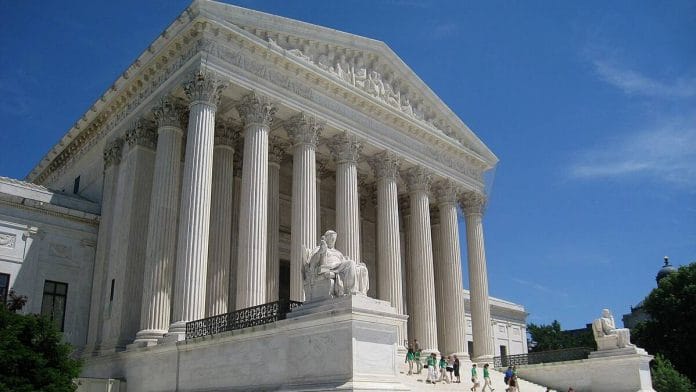New Delhi: The US Supreme Court Monday cleared the path for President Donald Trump’s administration to deport migrants to countries other than their own, without offering them a “meaningful opportunity” to tell US officials that they risk persecution in the new country.
Significantly, one of the three dissenters on the bench, Justice Sonia Sotomayor, ruled that the decision violated the “due process clause” by taking away the migrants’ opportunity to be heard.
The due process clause found in the Fifth Amendment to the US Constitution states that no one shall be “deprived of life, liberty or property without due process of law” by the federal government.
In Monday’s verdict, a nine-judge bench, by way of a 6:3 majority, ruled that a group of eight men, said to have been convicted of serious crimes, would be sent to South Sudan, a country which most of them had never set foot in, or had connection to. Presently, these men are being held at an American military base in Djibouti and the ruling allows them to be deported to South Sudan.
Since Trump returned to the White House this January, the Supreme Court’s intervention “on an emergency basis” has been sought in seven legal battles relating to his crackdown on immigration, Reuters had reported. The present ruling, too, comes without any reasons, as is often the case while deciding emergency requests.
The ruling also hit pause on an 18 April Massachusetts district court order that said migrants who had been selected for deportation to “third countries” must get a “meaningful opportunity” to tell US officials they are at risk of persecution in the new country.
Also Read: US deportations are typical Trump theatrics, redrawing American borders with permanent markers
The case & dissent
In the present case, Department of Homeland Security vs DVD, the court was acting on a plea filed by the DHS, challenging the 18 April order of the district court in Boston, where single judge Eric B. Murphy ruled that migrants should get 10 days to make claims about torture in a country where they are being deported.
In the same ruling, the judge had also said that 15 days’ time must be given to such migrants to challenge any findings that go against them. However, the government department challenged the verdict, arguing that such an order delayed the president’s ability to carry out foreign policy.
The case first garnered media attention when the eight migrants were loaded on a plane in May and were being sent to South Sudan, a violence-ridden country. Judge Murphy, however, on 21 May ruled that the removals violated his 18 April order requiring additional steps before deportation, including an opportunity to be heard. This led to the men’s deportation to being put on pause, and they were detained at a US base in Djibouti.
Not all judges part of Monday’s order have, however, agreed with the conservative majority’s stance.
Justices Sonia Sotomayor, Ketanji Brown Jackson and Elena Kagan not only held the view that the decision went against the due process clause, but also termed it a “gross abuse of the court’s equitable discretion”.
The due process clause represents the principle that “ours is a government of laws, not of men, and that we submit ourselves to rulers only if under rules”, according to the 1952 SCOTUS ruling in Youngstown Sheet & Tube Co. vs Sawyer.
“Congress expressly provided non-citizens with the right not to be removed to a country where they are likely to be tortured or killed,” Justice Sotomayor ruled in the dissent, which has been made public.
The dissent, authored by Sotomayor, also noted that the present decision found the idea of thousands suffering violence in far-flung locales more palatable than the remote possibility that a district court exceeded its remedial powers when it ordered the government to provide notice and process to which the plaintiffs were constitutionally and statutorily entitled.
Previously, in May this year, the top court had allowed the Trump administration to end humanitarian programmes for migrants living and working in the US temporarily. This decision also attracted criticism for removal of migrants under the Alien Enemies Act, a 1798 law used sparingly and only during wartime.
“This is not the first time the court closes its eyes to non-compliance, nor, I fear, will it be the last,” the dissent by Justice Sotomayor notes.
(Edited by Nida Fatima Siddiqui)






